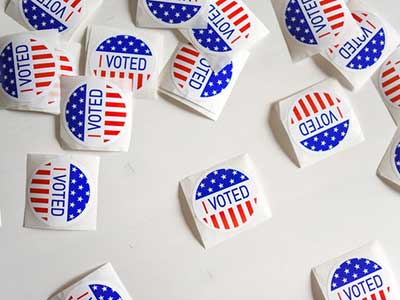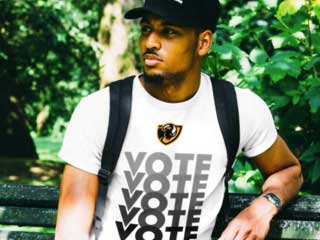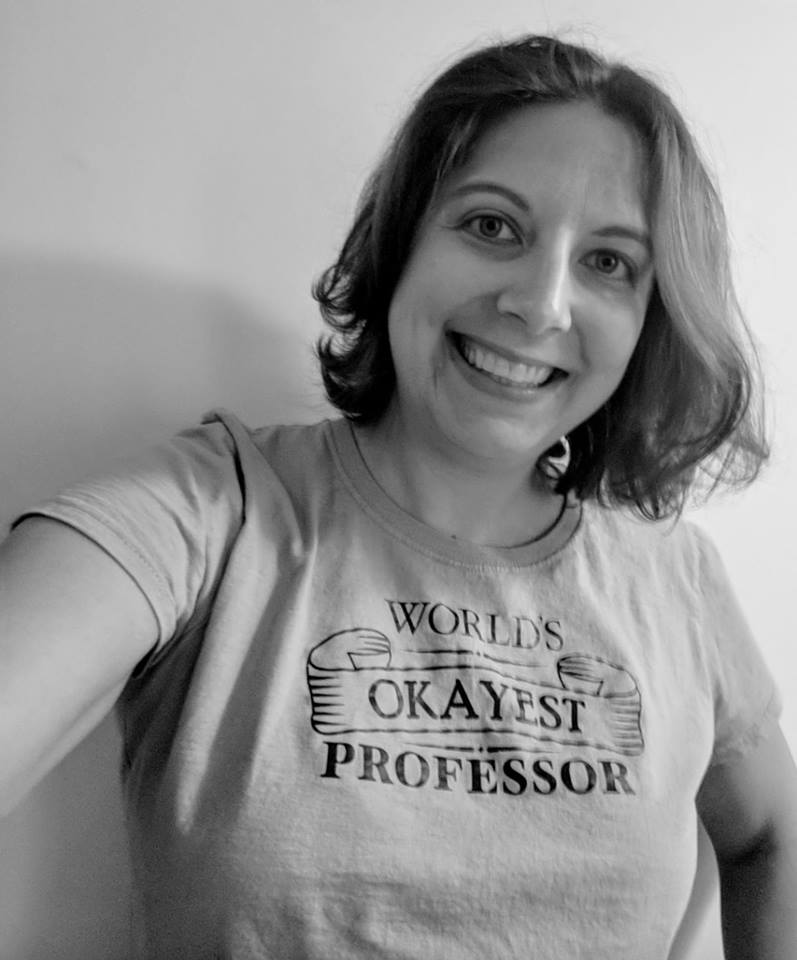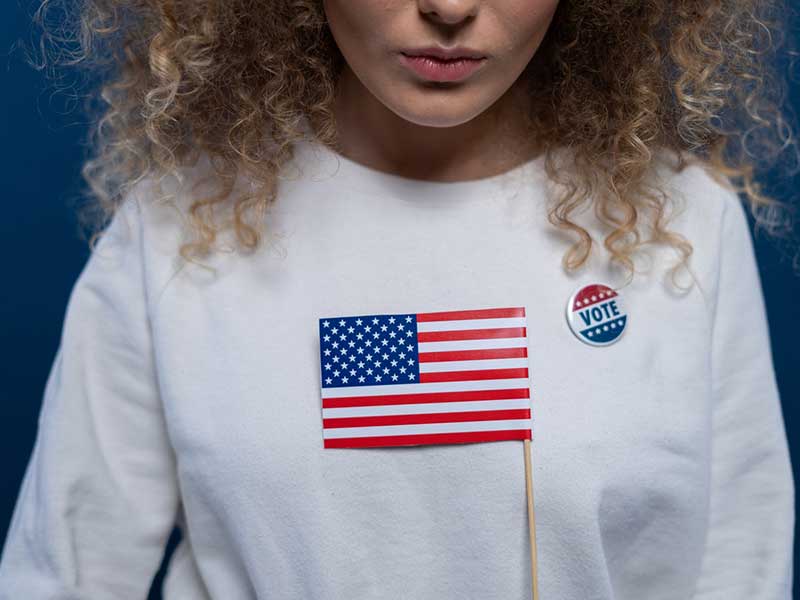I shouldn’t be writing this right now.
I should be dropping off my Amazon returns at the UPS store.
The boxes have been packed and sitting in my car for at least two weeks.
I only have until October 2 to return them.
I shouldn’t procrastinate any longer.
Yet here I am. Sitting in front of my computer. Not at the UPS store.
Because that’d mean I’d have to get dressed.
And drive all of 1.7 miles down the road.
And, hell, there’s always tomorrow, right?
Well, yes… but that was the same logic I had in June when I was supposed to mail in my state primary ballot and, uhhhh, that didn’t work out.
I moved to Virginia in 2014 after accepting a position on the faculty of VCU’s Department of Political Science. I registered right away. And I never missed an election.
Not the primaries, and not the generals.
Local? Yup. State? Yup. National? Yup.
Midterms, too? Oh yeah — I would neer miss a midterm.
I was an A+ voter. 100% grade on turnout.
And then…
Oy.
Then there was a pandemic.
And the state of Virginia made it easier to vote in the primaries by extending the date and instituting no-excuse absentee voting.
So I immediately requested my mail-in ballot, and it promptly arrived in the mail!
And then…
Oy.
It sat on top of a table in my living room for about a month.
Then I moved it to my bedroom nightstand so I wouldn’t forget.
And the thing is, I didn’t really forget.
I’d just wake up, see it and not mail it, because there was always tomorrow.
And then suddenly there were almost no more tomorrows!
I realized that if I dropped the damn envelope in the mail it might not make it in time before primary day...
Oops!
And yeah, I could have taken the absentee ballot to my polling precinct, but I didn’t, because the instructions were confusing and I didn’t want to waste my time if they were going to send me back home because I had done something wrong.
So now I don’t have a perfect voting record in Virginia anymore.
Womp womp.
Why am I sharing this story?

Because having a personalized voting plan — hear me? a plan! — turns out to be super important when getting people to actually… you know… vote! And not just show up to vote, but to cast their ballot appropriately so that it doesn’t end up getting rejected.
This is especially true of young voters, like me you! You know the gripes about “young people today”... They’re too busy spending their money on the increasingly skyrocketing cost of a college degree avocado toast!
And they are too busy Tik-Toking to care about politics…
When they’re not feeling the Bern, they’re just so darn apathetic!
But this isn’t true.
We know it’s not true because even when they’re feeling the Bern young voters don’t show up to the polls. During the 2020 Democratic presidential primaries, 43% of young voters (18-29) reported they were likely to vote in their party’s primary.
Narrator: They didn’t.
The actual voter turnout rate for young people during the Super Tuesday primaries is estimated to have ranged from a dismal 5% to a still unrespectable 19% depending on the state. Remember, this was before Biden began pulling away; Bernie was still in the thick of things.
Young voters were still feeling the Bern and that was their chance to help put him over the top.
"...young voters have always overestimated their good intentions to vote."
This isn’t a new trend—young people have always turned out at younger rates than older generations. So the older generations who are voting at higher rates right now didn’t start out that way. And young voters have always overestimated their good intentions to vote—the gap between young voters who say they’re going to vote and who actually do vote is about 32%, more than double the gap of voters who are sixty years or older. But just because it’s not new doesn’t mean it’s not a problem. It is a problem— “There is good scientific evidence that if young people turned out at the same rates as older citizens, American democracy would be transformed. Elected officials would be more likely to pay attention to the policy areas that young people care about, like climate change or public education; the people elected to public office would look more like the people they represent; and the set of public policies implemented would fundamentally change.”
So not voting shouldn’t be seen as an option no matter your political ideology or partisanship; not when there is an approximate 30-point voting gap between the youngest voters and the oldest voters. Not when doing so means that politicians will continue to pay more attention to your parents and grandparents! And not when doing so means that you’re going to be the ones left to live with the consequences of older voters’ actions!

So then why didn’t young people turn out?
Young voters (18-29) are more likely to report that having personal conflicts that interfere with voting than are older voters. They are also twice as likely to report issues with registration.
In contrast, roughly the same percentage of young voters reported being disinterested in the election or not feeling as though their vote counted, and young voters reported not likely any of the candidates at half the rate of other voters! So yeah, young voters’ absence on Election Days can’t be chalked up to apathy, no matter how much older voters would like that to be the narrative about those pesky kids!
In fact, most young voters do care about politics!
About three-quarters of young voters report being interested in politics and caring who becomes president. And about 85% report having an interest in public affairs more broadly.
Perhaps this shouldn’t be too surprising; after all, young people are generally active in politics in ways that older voters are not, like protests and political consumerism.
But voting is habitual—if you do it once, you’re more likely to do it again. And if you do it often, you’re more likely to be a regular voter. One of the voters the politicians try to woo. And that’s how previous generations of young non-voters have become voters… they’ve done it once… and then twice… and then another time until it became a habit. And they don’t get “too busy,” or forget to factor it into their work schedule, or forget to register correctly, or procrastinate, or not know where their polling place is, or any number of other reasons non-voters give for not showing up.
So getting young voters over that first hump is incredibly important!
Elections in the United States shouldn’t be so complicated, and yet, here we are.
Registration rules can be confusing! Voting procedures can be confusing! Especially during a pandemic where all sorts of election procedures are changing! Don’t feel like an idiot; I promise, the people who study this kind of stuff for a living find them to be confusing at times, too.
Seriously... I didn’t start writing this post until about noon today because I’m a procrastinator I was helping my sister figure out whether her expired license would still be accepted by Maryland’s online mail-in ballot request form (note: it will be accepted due to an extension passed by Gov. Hogan, but it took a lot of Googling and a phone call to the State Board of Elections to confirm it).
"...voting is habitual—if you do it once, you’re more likely to do it again."
But just because our voter registration and voting procedures are more complicated than they should be, doesn’t mean that they are particularly difficult to surmount. This is where a personalized voting plan comes in handy. A personalized voting plan helps you determine all the potential challenges you could face depending on which voting method you’d prefer to use when casting your ballot, and it helps you figure out what you’ll need to do to meet those challenges and have a successful voting experience.
Maybe you think you’ve got it all figured out—don’t! That’s hubris and it’s often what leads to that overconfidence gap! It’s what gets your ballot tossed out because you didn’t follow the instructions properly. It’s not a good look.
Hubris is what caused Icarus to fall from the sky! Hubris is (less dramatically) why I no longer have a perfect voting record in Virginia. And hubris is why I really need to stop writing and put some pants on so that I can finally bring those damn boxes to UPS before my return window expires.
So use the personalized voting plan tool that I’ve developed and share it with friends and family who plan to vote in the upcoming November elections. It’ll walk you through all the things you need to consider when voting, whether you choose to do so in person on Election Day or whether you plan to make use of an alternate option like voting early, or voting by mail, or voting via drop-off box. There’s going to be enough uncertainty with this election as is, there’s no need for you to add any new layers of uncertainty to it. And as always, if you have any questions don’t hesitate to ask the friendly experts who work for Virginia’s Department of Elections—and pick up a phone to do it… I know, I know… I’m a millennial; I think phones suck, too, but I did it and so can you… so really, use a phone, get an answer, and have the peace of mind that you won’t have any surprises when you try to cast your ballot. Surprises are vastly overrated anyway.
Be well and happy voting.
Dr. Alexandra Reckendorf
Assistant Professor of Political Science
Virginia Commonwealth University
About the Author

Alexandra Reckendorf, Ph.D., is an assistant professor of political science and associate chair of VCU's Department of Political Science.
Reckendorf was named a 2019 Distinguished Teacher in Humanities and Sciences award winner, and is a 2019-20 service learning faculty fellow with the VCU Division of Community Engagement.
She studies public opinion and political behavior in the United States, with particular emphasis on campaign, communication and media effects on candidate evaluation, political knowledge and policy preferences.
Reckendorf values providing unique experiential learning opportunities to her students—these include teaching an intersession class trip to New Hampshire for the "First in the Nation" presidential primaries, teaching a summer class trip along the Civil Rights Trail and advising the Ramerican Political Science Review, an undergraduate political science research journal.
Prior to her work in academia, Reckendorf worked at the Most Magical Place on Earth, Walt Disney World, and was a tour guide for the U.S. Capitol Building and the International Spy Museum.
